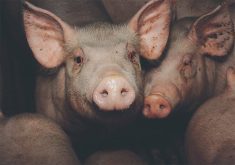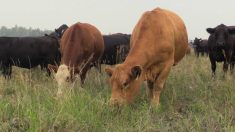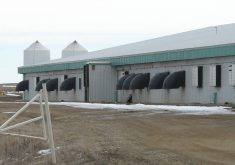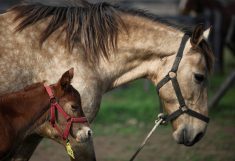On smaller, specialty hog farms, herd health — while taken just as seriously — can look a lot different, say two producers
Smaller-scale farmers have a part to play in keeping deadly African swine fever (ASF) out of Manitoba’s swine herd, says the Manitoba Pork Council.
“When African swine fever went from wild pigs in Germany into the domestic herd, the first time was a farm with four pigs, and the second time was a farm with six pigs,” said Cam Dahl, Manitoba Pork’s general manager during the group’s annual general meeting on April 6.
“ASF moving into those 10 pigs has cost billions of dollars,” he added.
A July 2021 Reuters report says the two German farms had about 200 pigs and two pigs respectively — both qualify as small farms in Manitoba.
The Manitoba Pork Council says it’s reaching out to smaller-scale hog farmers to talk about animal health and biosecurity.
Manitoba Pork has an email list of between 300 and 400 small-scale farms, said Mark Fynn, the council’s manager of quality assurance and animal care. These are farms that signed up for the PigTRACE program, which tracks hog movement around Canada.
Fynn said Manitoba Pork has reached out to members on that list. It’s more difficult, however, to pinpoint new farms or people who raise a few pigs at a time for personal use.
A Manitoba Pork spokesperson told the Co-operator they connected with Direct Farm Manitoba, which represents smaller-scale farmers, and passed on a link to a webinar on swine health.
Fynn also said he had spoken with the Manitoba Veterinary Association, and was trying to communicate with the Animal Nutrition Association of Canada to get handouts in stores that sell bagged feed to pig owners.
The Manitoba Co-operator spoke with two smaller-scale, but commercial, hog farmers about what animal health looks like on their farms, along with their concerns about foreign animal diseases like ASF.
Both have raised pigs for many years and direct market pork. They both participate in PigTRACE.
Zinn Farms
Andreas Zinn, who runs Zinn Farms with his family, raises about 300 Berkshire hogs, including sows and gilts, near Springstein. His family also raises meat chickens, laying hens, beef cattle and rabbits.
His market animals live on pasture in the summer, Zinn said. He puts his sows on pasture during gestation, but they live in the barn while they’re with boars, or with their piglets.
The market pigs are moved every day so they get fresh grass, don’t root up the pasture too badly, and don’t live in their own feces.
Zinn said that while he’s concerned with biosecurity, his first priority is animal health.
“In my mind, whether you’re an animal or a human, the best thing you can do to prevent yourself from getting sick is just generally living and being a healthy pig or a healthy person,” he said.
A vigorous pig is better able to resist disease, he said.
He said this means giving the pigs a “low-stress” life. They live in large pens when inside the barn, and they don’t use gestation or farrowing crates. Wooden walls, straw on the ground and many windows to let in sunlight make the barns more comfortable to lie in, Zinn said.
Unlike a large, conventional hog operation, workers on the farm don’t shower or change clothes when they move between the pigs and Zinn’s other animals. They will change boots between species — most of the time — and have designated boots for trips to the abattoir.
If pigs get sick, they may disinfect the pen or keep it empty for an extended period. They treat animals with medication on an as-needed basis.
Zinn told the Co-operator that in his experience, if piglets get scours, the sow can usually get them healthy on her own. They’ve never had to treat piglets for diarrhea.
The farm is largely a closed system, rarely bringing in animals from the outside. When they do bring in new genetics, Zinn said he only buys them from farms where he knows the farmer has a similar management style to his and produces vigorous pigs with little dependence on medication.
There’s no known wild pig activity in his area.
“I’m not saying the way we raise our animals makes us immune to getting those diseases, but it’s not really a thing that’s — it’s not on the forefront of my mind,” Zinn said.
The Smith farm
Ian Smith raises between 200 and 250 pigs, including sows and gilts, near Argyle. He also raises registered shorthorn cattle for beef and breeding stock, and keeps about 80 laying hens.
His sows live outside, with access to the outdoors year round if the weather allows. His market pigs live inside an “old-school” barn built in 1969.
Smith spreads fresh straw twice per day, and the pens are scraped into the gutter every day — the barn doesn’t have the pit system common to modern, conventional barns.
“I don’t cut corners and I don’t feed any medicated feed,” Smith said, adding he follows industry codes, is CQA (Canadian Quality Assurance program) certified, and maintains biosecurity measures.
“I feel my biosecurity is better than any hog operation in the province because I haven’t brought a pig into this farm for eight or nine years,” Smith said.
He uses artificial insemination for breeding and keeps his own gilts.
When pigs are outdoors, they’re within an electric fence. Smith said he’s never had issues with wild animals entering the pens and there is no sign of wild pigs in his area. He’s the only worker on the farm, so outsiders aren’t entering the barn.
He makes his own feed. The pigs don’t eat table scraps, Smith said.
When Smith takes pigs to the abattoir near Beausejour, he said he uses plastic boot covers and cleans the trailer.
Smith said he’s “big time” concerned that the pork sector will be laid low by ASF but is less concerned about his own farm.
“This could be disastrous,” he said, “but in my situation with me being so small, maybe I have a bit of an advantage because I have my own customers.”
Assuming pigs are healthy, Smith said he’ll be able to have them slaughtered and will be able to serve his customers.
“I’m not trying to tell people that my system is the best system and the only system,” Smith said. “I’m just saying that my dad always said, ‘if it’s not broke, don’t fix it.’”
















